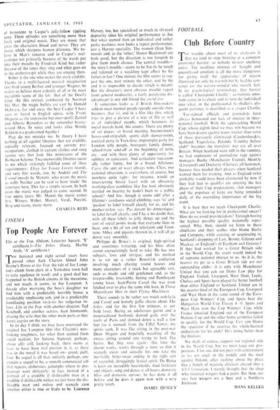CINEMA
Top People Are Forever
Life at the Top. (Odeon, Leicester Square, 'X' certificate.)—The Joker. (Jacey, Marble Arch, 'A' certificate.)
TEN fictional and eight actual years have passed since Jack Clayton filmed John Braine's Room at the Top, the tale of Joe Lamp- ton's climb from clerk in a Yorkshire town hall to tatty opulence in wool; and a good deal has happened to the British cinema in the meantime, and not much, it seems, to Joe Lampton. A decade after marrying the boss's daughter we find him with a predictably horrible house, a predictably unpleasing son, and in a predictably humiliating position vis-a-vis his vulgarian in- laws. Life at the Top, with another director, Ted Kotchoff, and another actress, Jean Simmonds, playing the wife (but the other main parts as they were), carries on the story.
In its day I think we may have overrated the original Joe Lampton film (for Clayton's new- looking toughness, for what then seemed fresh social realism; for Simone Signoret, perhaps, above all); still, looking back, there seems at Last to have been real passion in it, as there
■ %:is in the novel it was based on—greed, guilt, love. Its sequel is all that, unfairly perhaps, one expects a sequel to be, a smooth commercial job that repeats, elaborates. galumphs where its pre- decessor went delicately; in fact, instead of a portrait of a credible if dislikeable man in a credible if dislikeable milieu we just have the dis- likeable man and milieu and scarcely care whether either is true or likely to be. Laurence Harvey, too, has specialised so much in slit-eyed depravity since his original performance as Joe that what seemed then an individual and rather perky nastiness now looks a repeat performance, just a Harvey speciality. The women (Jean Sim- monds and, as the 'other,' Honor Blackman) are both good, but the direction is too lumpish to give them much chance. The central trouble— the story's trouble—seems to be Joe (is he tough and talented or a weakling kept afloat by his father-in-law? One minute the film seems to sug- gest the one, next minute the other, and by the end it is impossible to decide which is meant). But the director's most obvious trouble (apart from general mediocrity, a fairly paralysing dis- advantage) is our old friend the social eye.
It sometimes looks as if British film-makers seldom meet normal people (people outside show business, that is), and in a film like this, which tries to give a picture of a way of life as well as of individual people, which hammers its social morals hard, this counts. There are plenty of set pieces—at board meeting, businessmen's Savoy-and-strip-club, sports club shower-room, cocktail party in Yorkshire, impromptu party for London telly people, bourgeois family dinner, school-train send-off at the beginning of term, etc. and with them plenty of opportunity for subtlety or caricature. And caricature (occasion- ally rather funny, but in a broad, hilarious, Carry On sort of way) always wins. Class, our national obsession, is everywhere, of course, but nowhere quite right : for instance, would an interviewing board faced with an obviously working-class candidate like Joe look obviously startled on hearing he hadn't been to a public school? And Joe, though it seems odd after a lifetime's assiduous social climbing, says `ta' and 'pardon' to label himself clearly for us, and his mother-in-law says 'Pas devant les domestiques' to label herself clearly, and I ha .'e no doubt that, with all these labels to jolly things up and the sort of social points made that everyone likes to hear, and a bit of sex and television and Foun- tains Abbey and pigeons thrown in, it will all go down very smoothly.
Philippe de Broca's is original, high-spirited and sometimes irritating, and his films often sound excruciatingly hard to take. He has two subjects, love and intrigue, and his method is to stir up a rather Renoirish confusion involving much chasing round houses and many characters of a stock but agreeable sort. such as maids and old gentlemen and, as the irrepressible, irresistible, fizzing and flamboyant young lover, Jean-Pierre Cassel (he was even fetched over to play the same role here, in Those Magnificent Men in their Flying Machines).
There sounds to be rather too much ooh-la-la and Cassel and homely gallic charm about The Joker, and for the first few minutes, as our bold lover, fleeing an adulterous garret and a moustachioed husband, danced gaily over the roofs of Paris and shinned down a wall a few feet (so it seemed) from the Eiffel Tower, my spirits sank. It was like sitting in the post-war Deux Magots and hopefully watching all the extras sitting around one trying to look like Sartre. But they rose again : this time the charm works, works through a story so thin it scarcely exists and actually lets one take the inevitably bitter-sweet ending in the right sort of regretful, shruggingly lyrical spirit. De Broca is keen on incredible households, mad furniture and objects, song and dance at all hours, domestic bliss and domestic uproar: he has done it all before and he does it again now with a very pretty touch.
ISABEL QUIGLY


































 Previous page
Previous page